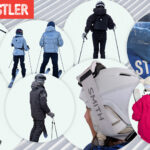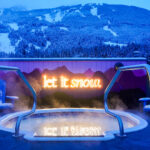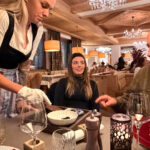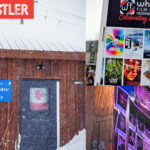from Buyer’s Guide 2011 issue
There’s $50 in my ski pants that says we can beat the $1-billion Vancouver-Whistler Olympic security dragnet.
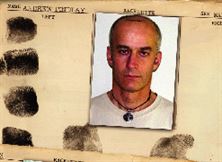
It’s a late February winter day. F-16s circle high overhead in the blue sky as we graze the aisles of a grocery store in Squamish, ambiguous European-sounding accents from Games visitors drifting out from the various checkouts. Ned, Dave and I are busy provisioning for an end-run through the glaciated Garibaldi Park backcountry—and around the security checkpoint north of town where we had been turned back 30 minutes ago by a phalanx of reflective vest-wearing, cheery volunteers while two supervising police officers sat in their squad car watching us warily.
As Olympic fever swept Sea-to-Sky country last winter, we had heard rumours of elite storm troopers sweeping down from the sky in helicopters or overland via supercharged snowmobiles to intercept defiant skiers determined to pierce the ridiculous no-go zone that had been established around the backcountry of Whistler for the Olympics. Could it be true?
Though I was on the verge of becoming a father, I was also compelled to undertake one act of defiance. So with packs stuffed with easily consumed calories, we slip clandestinely back into the van and make our way into the fading afternoon sunlight to the Diamond Head trailhead.
The parking lot, normally packed with Vancouverites, is empty. With skins applied to ski bases, boots adjusted to walking mode, we slide past the trail sign and into the woods. Our adventure begins. It’s hard to beat the mountains on a crisp, clear winter’s day, when afternoon light morphs into warm tangerine hues, the shadows grow long and the brightest of the stars first begin to appear. All is quiet in the alpenglow except for our breathing and the swish of skis sliding across snow. The air is cold; all sounds absorbed by the forest.
We are travelling by moonlight when, two-and- a-half hours later, we reach the Elfin Lakes shelter. Three shocked expressions greet us as we open the doorway and emerge from the starry night into the cabin’s warmth.
“Hello there,” I say in my most convivial tones, trying not to draw suspicion to our mission.
Silence.
“How’s the skiing?” I lob another trite greeting, trying to break the chill.
“Ya, ya, eez good,” replies the grizzled member of the trio in a thick Slavic accent.
The others, a sleek couple, simply nod their heads and avoid eye contact. We exchange some polite words but when I tell them we’re planning to ski over the Garibaldi Neve, they rapidly clear up their stuff and retreat to the sleeping loft without a word. Soon there’s nothing but the rustling of sleeping bags. We’re left alone with a plastic container of red wine but no vessels with which to drink it, so we borrow the tin cups of our cabin-mates that had been washed and neatly tucked away. Sleep comes but I am restless with anticipation.
Late the next morning, I am lost in the rhythm of the ascent, meandering around cavernous crevasses as we near the high point of the Neve. Mount Garibaldi is a blaze of white, towering to the west. My mind searches for distractions and finds one in the F-16 that has been circling high above us all morning in the surreal blue, at a cost of between five and ten thousand tax dollars per hour, likely deploying all kinds of high-tech gadgetry to monitor the mountains for security breaches.
I imagine a high-definition camera in the sky fit for 007, monitoring our antlike progress, dispatching data back to the temporary top-secret military compound that has been established on the outskirts of Whistler to protect the athletes from no specific threats. The appropriate officials will have already been notified and well-oiled security response protocols enacted, triggering an inexorable sequence of events. There will be an exciting backcountry cat-and- mouse pursuit. We’ll be apprehended, arrested, interrogated and later there will be a press conference, which will be the first time my wife will hear of my running afoul of Olympic security. There will be tears—or not.
This faint hope propels us onward. As we crest the Neve, Garibaldi Lake comes into view, stretching out far below us toward the bony finger of the Black Tusk. We peel skins from our skis, suck back some calories and begin cranking turns down a massive convex carpet of boot-deep fluff that rolls ever steeper. We take joy in these simple powder pleasures, fortifying our spirits for the tough sledding that lies ahead. Eventually this unexpectedly gorgeous powder face spills out onto the glacier-tilled delta at the south end of Garibaldi Lake.
We pause for a break at the battered old hut originally built to accommodate visiting glaciologists—but now, mice. I linger just long enough to thumb the logbook but clandestinely choose not to sign, leaving no trace of our passing—except, of course, our tracks that will soon be erased by wind and snowfall. We start the six-km-long traverse of the lake, during which we will be exposed and at our most vulnerable. It is pancake flat and an exercise in tedium.
The scale of the landscape around us is so grand it creates a treadmill optical illusion, making it seem as if our destination on the far shore gets no closer no matter how many strides we take toward it. Eventually thoughts turn to beer and my soon-to-be-born child— and how I may miss the birth if I get swept up by some gulag of Olympic security. A strange panic sets in.
When we finally reach the shore, night is falling. We follow our torch beams down the endless switchbacks of the Garibaldi Lake trail. An hour later headlights are spotted bobbing like fireflies in the murk of the dark woods below us. We extinguish our lights, blend stealthily into the forest and wait. Four hale young men pass by silently, masquerading as UBC Varsity Outdoor Club members but no doubt part of a crack military SWAT team. However, they fail to catch our scent, which is now two days old. When it’s deemed safe, we resume our descent. The clock approaches 2100 hours as we stumble onto the Sea to Sky Highway.
Having successfully circumvented the roadblock north of Squamish, we stick out our thumbs, hoping in vain for a lift to Whistler. Eventually a car stops. It has red-and-white lights on its roof.
“What are you guys doing here?” asks the portly cop inside.
We explain how we had just skied over the Garibaldi Neve from Diamond Head and are now looking for a ride.
“Good for you,” he says. “You sure had great weather for it.”
Unsettled by his amicable demeanor, we glance nervously around expecting the aforementioned SWAT team to leap out of the forest. Instead, a bus suddenly roars past shuttling spectators to Whistler from Squamish, spraying our packs and skis with
slush. The police officer continues to chat and inform us about Team Canada’s manhandling of the Russians earlier in the evening.
There would be no SWAT team, no news conference with flashing camera bulbs or a teary phone call to my wife. Just the memories of another great ski tour through Garibaldi Park, of a star-filled sky and the silence of the winter wilderness. And thankfully, I’ll be home for the birth of my child.
